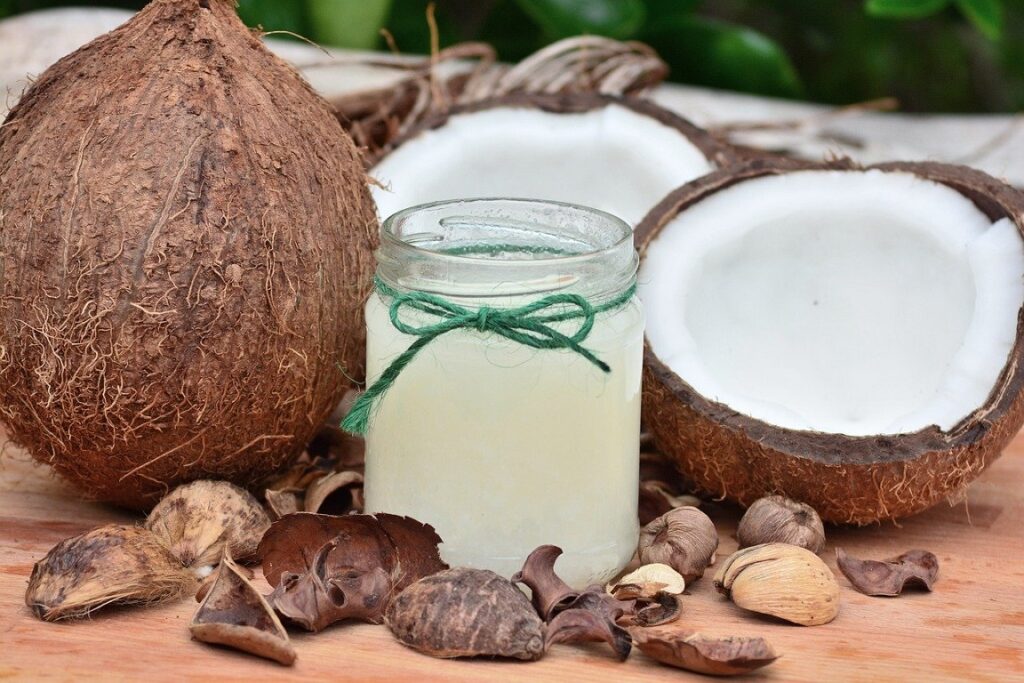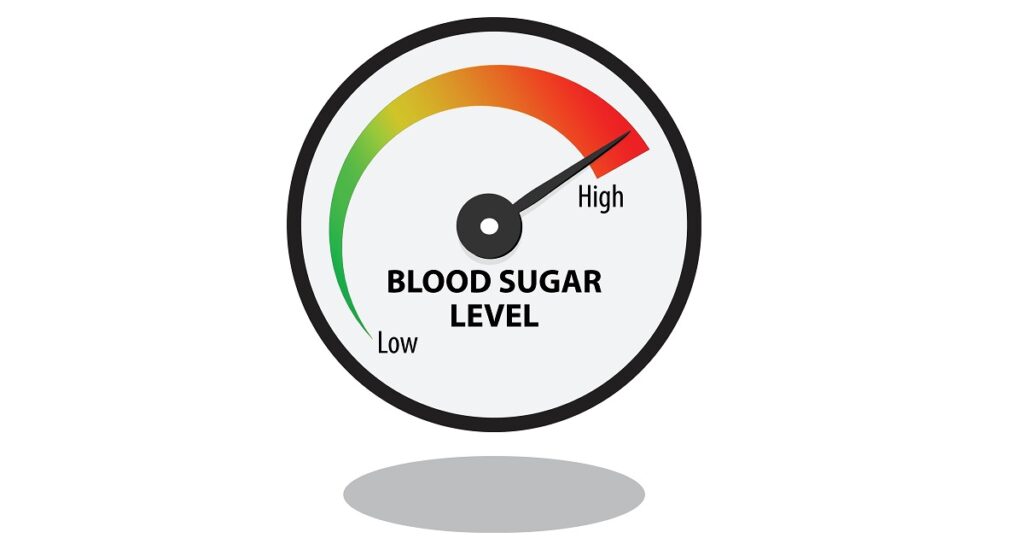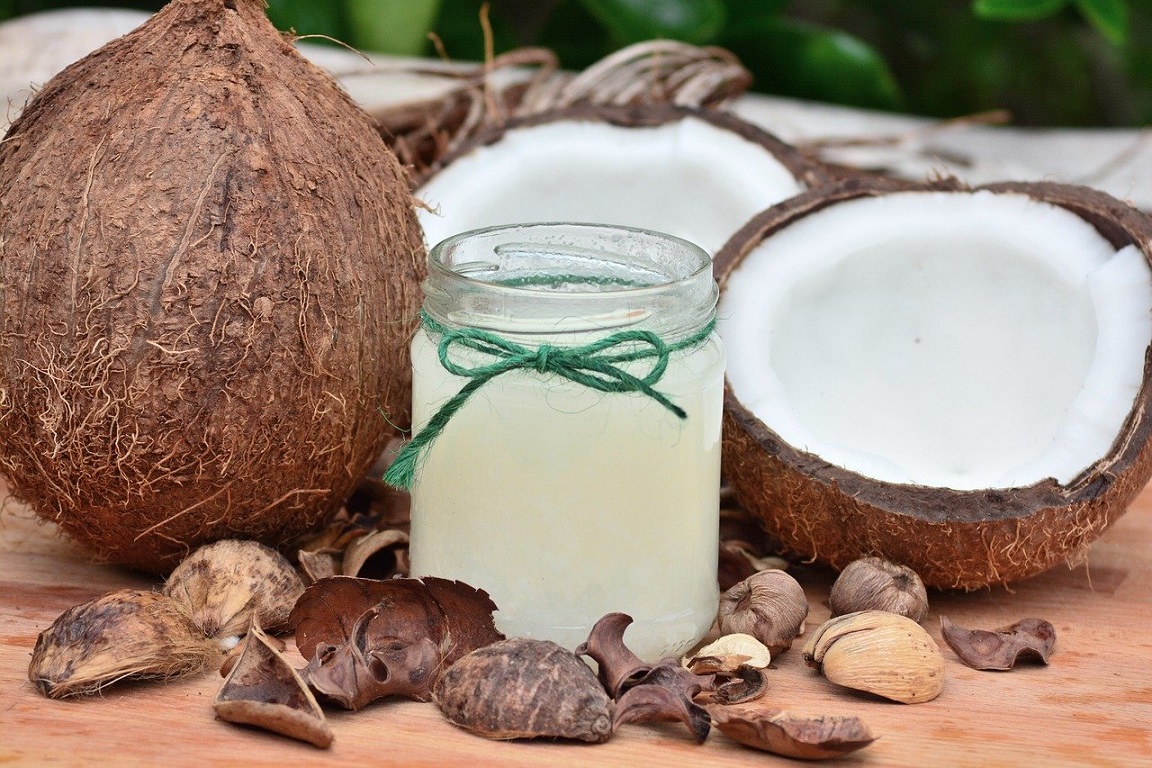Coconut Oil for Dogs
Using Coconut Oil for dogs is a common home remedy. It is easy to procure and safe to use. Coconut oil is a “good to have’ ingredient in your health care supplement list for your dog.

Composition of Coconut Oil
Coconut Oil is a superfood health supplement. Composed of ‘friendly’ fatty acids, coconut oil offers an array of health benefits for dogs. Coconut oil has about 90% of saturated fatty acids. These saturated fats contain Medium Chain Triglycerides (MCTs) which get metabolized straight to the liver from the digestive tract. Components of MCT include lauric acid, caprylic acid, capric acid, myristic acid and palmitic. The oil contains negligible amounts of trans fatty acids (unhealthy fats). The dog metabolizes these acids efficiently and there is a general boost of good health of your dog.
Virgin Coconut Oil (VCO- Cold Pressed)
Virgin coconut oil is extracted from the fresh milk of coconut. It is termed as ‘Cold Pressed’ as the extraction is done under a low temperature using a press. This extraction process is preferred over that of the ‘Refined Process” as it maintains all the natural constituents, aroma, and antioxidants of the oil.
Nutrient Absorption And Digestion
Many minerals and vitamins that are good for the dog’s health are fat-soluble. These include calcium, magnesium, Vitamins A, E, K, and D, vital proteins, and b-amino acids. These saturated fats absorb the minerals and vitamins and in turn get themselves easily digested in the gut.

Coconut oil contains Lauric acid which has several antiviral and antibacterial properties. These properties break down the unhealthy bacteria in the stomach and intestine of the dog. These anti-microbial properties of Coconut Oil lead to better gut health of the dog with fewer episodes of indigestion.
It should be noted that the above-mentioned properties are conducive to the removal of ticks in dogs as well. Click here to read more on our Home Remedies for Tick removal in dogs.
Digestive Disorders
As with humans inflammatory bowel syndrome (IBS) and colitis can occur in pets as well. The anti-inflammatory, anti-viral and anti-bacterial properties of Coconut oil helps in healing injuries of the digestive tract and prevent recurrent inflammation.
Weight Loss and Obesity

Dogs being overweight is a common issue today. The carbohydrate-centric diet they are fed is resulting in some long-term health consequences. Adding coconut oil to your dog’s diet can help with weight loss.
The liver processes the saturated fats of coconut oil for energy and hence not added to body fat. The MCTs also produce chemicals (peptide YY and leptin) thus reducing appetite and hence calorie intake is less. This combined effect assists in weight loss.
The MCTs in Coconut oil also encourage the growth of good bacteria in the stomach and support the gut lining which also contributes to weight loss.
Aids in Arthritis and Ligament Problems
Adding coconut oil daily to the diet of the dog can help reduce pain related with arthritis. The medium chain fatty acids found in coconut oil include caprylic, decanoic, lauric, myristic, palmitic, and oleic acids. Some of these acids reverses damage that aggravates arthritis symptoms.
Energy Booster

Coconut oil has about 90% of saturated fatty acids. These saturated fats contain Medium Chain Triglycerides (MCTs). These MCT’s are absorbed and utilized by the body’s cells more rapidly compared to longer-chain triglycerides (like those in meats and dairy products). This means the cells can produce more cellular energy due to which the general energy level of the dog also increases.
Assists in Balancing Glucose Levels (Blood Sugar)
The process of digestion includes the breaking down of food into components such as glucose. The pancreas creates insulin to helps control blood glucose levels by signaling the liver and muscle and fat cells to take in glucose from the blood. When there is a problem with insulin production by the pancreas, there is an increase in glucose levels which could result in hyperglycemia and other associated health problems.

Coconut oil assists in the balancing of sugar levels. The medium-chain fatty acids can help moderate sugar release and balance blood sugar levels. Coconut oil reduces the stress on the pancreas to produce high amounts of digestive enzymes thus allowing the organ to function more effectively.
How to add coconut oil to the diet of the dog.
Add Coconut oil to one meal every day. The amount depends on the size of the dog. An initial dose of ¼ teaspoon daily for small dogs up to 1 teaspoon and 1 tablespoon daily for big dogs. If your dog tolerates it well after 2 weeks, increase the dose to (5 mL per 4.5 kg) of body weight.
Stools/diarrhea are possible side effects of too large a dose.
Any dog who is receiving coconut oil should be closely monitored for weight gain.
About Author
Zarir Karbhari dedicates his waking hours to the welfare of stray and abandoned animals on the streets of Pune. He is a Civil Engineer by education and ran a software development company for over 25 years till his life quite literally went to the dogs.
Best Selling Dry Food
[slide-anything id=”4291″]






